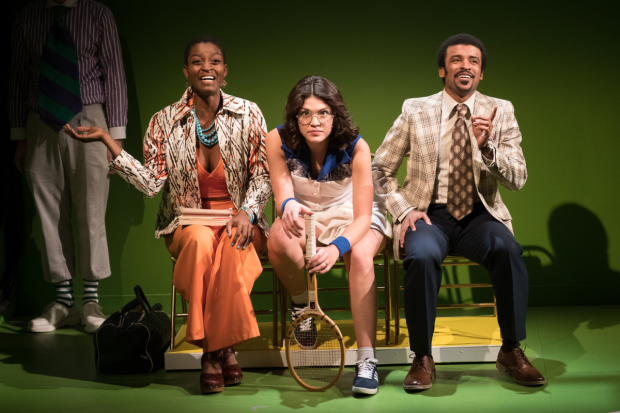Balls
One Year Lease and Stages Repertory Theatre coproduce a battle of the sexes at 59E59 Theaters.

(© Russ Rowland)
Take any conflict from Adam and Eve to the 2016 election and playwriting partners Kevin Armento and Bryony Lavery will show you how it all comes back to balls. After all, what is existence but a battle between people who have them and people who don't, all of whom want control over the giant one on which we find ourselves floating through space? It almost makes you wonder how creative alliances formed behind the scenes as a male-female playwriting team joined with a male-female directing team (Nick Flint and Ianthe Demos) to piece together a play with so many colliding spheres.
For those wanting to preemptively parse the irreverent title, Balls (now running at 59E59 Theaters) is a sports metaphor wrapped in a cosmic allegory tied with an intersectional "battle of the sexes" ribbon. The famous tennis-world "battle of the sexes" — the 1973 matchup between 29-year-old Billie Jean King and 55-year-old Bobby Riggs — is the play's centerpiece, with Ellen Tamaki (King) and Donald Corren (Riggs) gracefully channeling their historic counterparts (in Kenisha Kelly's historically accurate costumes) to reenact the three sets that made King a feminist hero.
However, as generations wear on (in both life and the play), we see this binary battle encroach upon every other social sphere, touching racial bias, L.G.B.T.Q. rights, age discrimination, and our growing obsession with celebrity, to name a few. In less than 90 minutes, Armento and Lavery try to follow all of these tracks, showing just how many balls were truly on the court when Billie Jean showed the world that women can do just fine outside the bedroom and the kitchen.A few decades of perspective has shown that it was too many for one pair of athletes to claim responsibility. And while Armento and Lavery manage to juggle a lot in their idea-heavy and plot-light story, quantity ends up burdening a play that could have used a far more delicate touch.
Stories circle King and Riggs like satellites, each additional character tossing his or her own baggage onto the court (a literal tennis court designed by Kristen Robinson). Up in the stands you have tennis fans Terry and Cherry — a husband-and-wife team (all-American loudmouths played by Danny Bernardy and Cristina Pitter) divided along gender lines as they root for Bobby and Billie Jean, respectively.
But all bets are off when Cherry learns about Billie Jean's lesbian affair with her personal secretary, Marilyn Barnett (played by Zakiya Iman Markland, who offers a moving first-person account of Marilyn's story). Equality for women is great, of course — but only for a certain kind of woman. Then, down by the net, we have the Ballboy and Ballgirl (Alex J. Gould and Elisha Mudly) whom we watch go from flirtation to marriage to bitter divorce with the help of arguments over home-career balance and abortion.
Linking these scenes together is an umpire who calls both the match and other concurrent cultural events from the Roe v. Wade ruling to Barbie's 14th birthday — and don't forget the pair of clowns (Richard Saudek and Olivia McGiff) serving as line judges and perhaps engaging in a gender battle of their own. Danté Jeanfelix, meanwhile, plays Billie Jean's husband, Larry King, in addition to former football player Jim Brown. Brown and tennis champion Chris Evert (also played by Mudly) were both in attendance at the legendary exhibition match, so Armento and Lavery used their presence to explore two more public careers — Brown, now a struggling actor, smiling through bad press and Evert explaining her marital failures to scrutinizing fans.
Through this web of characters, we're led down a rabbit hole of questions: Where is the line between role model and human being? Where is the line between conflict and collaboration? And where is the line between societal expectation and authentic identity? There's not nearly enough time to focus on any of these questions, but they're valuable topics to walk out the door pondering.
The one overarching thought the play does pause to consider is: "Have things gotten better?" Looking at the outcome of America's most recent battle of the sexes, the cynics in the audience may give a definitive no. And yet, perhaps the battles waged and victories won behind closed doors carry just as much weight as the ones thrown in our faces on national television. Maybe, at the end of the day, the ball is in our court.







